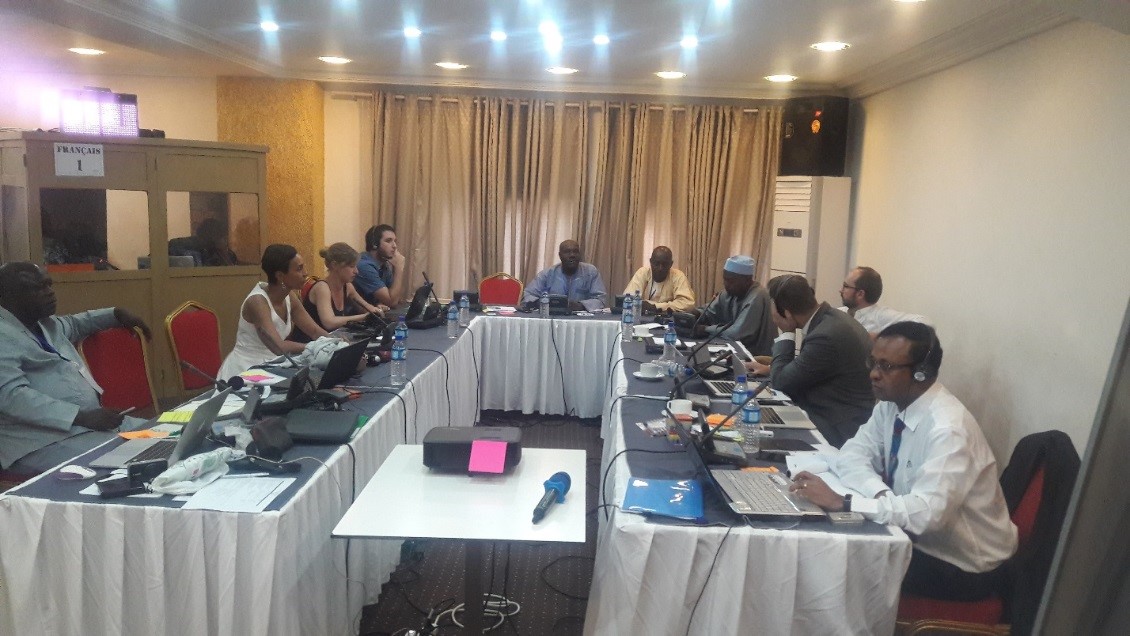
Participants from the African Society of Laboratory Medicine, Fondation Mérieux, Ministry of Health Niger and InSTEDD.
Source: Odile Ouwe Missi Oukem, Fondation Mérieux
Information and data about laboratory capacity and locations across countries in Africa are largely difficult to access, out of date, or incomplete. This causes many challenges in enhancing laboratory network capacity for improved patient testing and support of public health needs. As such, the mapping of laboratory capacity across the continent has been identified as a key priority for the development of laboratory networks in Africa.
The African Society for Laboratory Medicine (ASLM) has received funding from the Bill and Melinda Gates Foundation to build a centralized platform for collecting data and providing software tools to better support, manage and plan for laboratory services throughout Africa. The non-profit organization Innovative Support to Emergencies Diseases and Disasters (InSTEDD) is partnering with ASLM to:
- Establish a set of global ASLM technologies to create an ASLM laboratory registry, planning tools, and other services,
- Provide technical support to create and maintain national laboratory registries, and
- Link programmatic laboratory data (e.g., Stepwise Laboratory Improvement Process Towards Accreditation [SLIPTA], external quality assessment) or connected laboratory instruments to the centralized platform and the planning tool
Multiple uses for this system are anticipated, including support for evidence-based decision making for governments, regional bodies, funding institutions, private companies and researchers. The first stage of the project is taking place in Niger in collaboration with Fondation Mérieux. The project will take advantage of the DHIS-2 health management information system platform. Niger has recently been facing a Rift valley fever outbreak and is in need of partnership to support their efforts to build their national laboratory network. Ethiopia is the second country foreseen to participate in the first phase.
A stakeholder meeting in preparation for the Niger activities was organized with representatives from the Niger Ministry of Health, Fondation Mérieux, InSTEDD and ASLM in Cotonou, Benin in conjunction with the Réseau d’Afrique de l’Ouest des Laboratoires d’Analyses Médicales (RESAOLAB) and West Africa Regional Disease Surveillance Capacity Strengthening (WARDS) meeting, a gathering that included 7 West African countries. A stakeholder meeting led by the Ethiopian Institute of Public Health is planned for 4 July 2017 in Addis Ababa, Ethiopia.
During the Benin meeting, Dr Mamane Maty, Director of health laboratory services in Niger said, ‘We welcome this initiative that will help us to optimize our national laboratory network to better respond to health threats with the resources available.’
Moving forward, ASLM envisions expanding this platform to the whole continent. The possibility of overlaying laboratory mapping data with different types of information, such as disease prevalence, test volumes, population characteristics, road networks, etc., is extremely relevant to adapting laboratory networks to upcoming health challenges and the evolving socio-economic landscape.
Political support from Africa Centers for Disease Control and Prevention, the World Health Organization’s Regional Office for Africa and the health institutions of the five economic regions of Africa will be keys to the success of this initiative.
By: Aytenew Ashenafi and Pascale Ondoa, ASLM; Editor: Bethanie Rammer, ASLM
